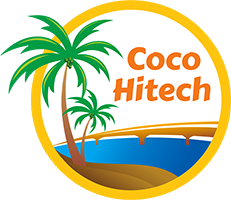With new technology, fresh coconut will be secure and not damaged in transit for export.
With scientific research project “Improving preservation technology fresh coconut juice for export,” Master Tran Thi Yen Thao and his colleagues at the Research Institute of Oil and Oil crops (Ministry of Trade and Industry) has research into the technology of preserving fresh coconut 6 weeks, the loss ratio below 10%. This result may give fresh coconut, a strength of Ben Tre province and the Mekong Delta to become export commodities bring higher economic resources.
The area planted to coconut fruit is taken in Vietnam by the survey team is about 150,000 ha, producing about 720 million left / year, mainly concentrated in the Mekong Delta and the Central Coast. This area is growing rapidly due to market demand for coconut products, particularly for export markets. For example, the area of Ben Tre coconut cultivation is 35,000 hectares in 2003, after 2 years has reached 38,000 hectares and has now reached more than 40,000 hectares and production of coconuts than 300 million / year. The goal of the province’s 2010 will develop 5,000 hectares of coconut.
The fresh coconut drink of Vietnam is the Siamese coconut, coconut waist, Tam Quan coconut, coconut Siamese which is the largest planting area. The quality standards of APCC (Asian Pacific Coconut Community – Community Asian Pacific Coconut) quality fresh coconut water exports, which are products of export potential Vietnam. Currently, there are many fresh coconut drink orders from foreign countries, mainly Korea, Japan, the European markets such as France, the Netherlands, Germany also promising. However, most exporters are still preserved coconut technologies niche.
According to the People’s Committee of Ben Tre, in 23 exports of coconut trees, the export business mainly copra and desiccated coconut. Many businesses try exporting fresh coconut but the results are not as expected.
Import and Export Co., Ben Tre coconut fruit came to Hong Kong. Fresh coconuts are harvested after closing in sacks or baskets (10-20 left / bag or basket), then transported by ship quickly within 2-3 days, but as to where the depleted bulk failure. Do not give up, the company continues to test new shipment to Korea. Fresh coconut peel, chemical processing, drying, packing, carton for the (8-16 Left / barrel) and put into cold from 3-50C container for shipping. But coconut is still much wastage from 30% to full damage.
Representing a private business (not name) said: “We try to go out every 6,000 Japanese green fresh coconut shell. Although preserved in refrigerated containers 150C and shipped by sea, but the whole fruit still pouring when the ship docked. ”
Given the problems of many professional business enterprise coconut products, Department of Science and Technology of Ben Tre has ordered Master Thao and his colleagues at the Research Institute of Oil and Oil crops of new storage technologies
Back after a long time test results in Ben Tre, Master Thao cheerfully, “because they must wait for feedback after the shipment for export to South Korea to experience slightly longer time. But, with the result that not a fresh coconut is damaged, we feel very happy. ”
To be able to offer a complete preservation process, during the first year, the team had time to study for fruit picking and consistent manner. Chemical storage is also causing headaches researchers. “There are lots of fresh coconut long chemical help but pick out of chemicals are recognized around the world for food safety to export is not simple,” Thao said. In addition, the packaging for storage is also important.
After successful testing, announced Thao finishing processes, ensuring fresh coconuts still in the 6 weeks including fruit picking who turns 8 months old when, bring surface treatment and chemical processing. With coconut peel, sulphites are used compound is sodium metabisulfite, 1 storage temperatures from-40C. With left in shell, suitable preservative calcium hydroxide is sodium Benzonate 1% and 0.5%, stored at 80C temperature.
To apply this technology, “the only investment firms have to spend is to shrink collage system worth several hundred million,” Thao said.
Investment is not large but profits are quite large. According to the team’s calculations, while prices in the domestic market does not exceed 5,000 VND / fruit export prices to South Korea about 21,000 VND / left. Minus the shipping cost and storage, export earnings could increase nearly 14 times the original amount.
With this result, businesses are anxiously awaiting transfer this technology even in 2009. However, to do this, there should be coordination from all units of the subject and ordered the Department of Science and Technology of Ben Tre province.

COCO HITECH JSC
261-263 Phan Xich Long Street, Ward 2, Phu Nhuan District, Ho Chi Minh City, Vietnam Tel: +8493 8244404 (Vietnam) Email: info@cocohitech.com https://cocohitech.com | https://coconutpowder.net